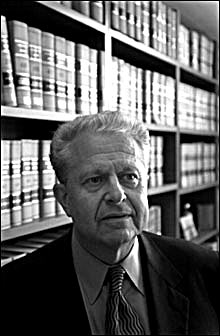
Laurence H. Tribe |
It was a typical Harvard alumni event, but not a typical, self-congratulatory Crimson “glory days” fest. The four-day program this past weekend celebrated the quarter century since Harvard, after years of foot-dragging resistance, welcomed the Harvard Gay & Lesbian Caucus under the university Alumni Association’s umbrella. From its early struggle for recognition to its current membership of more than 4800 alumni, the caucus has come a long way, typified by a panel discussion on Saturday titled “The State of the Law: Reflections on the Past 25 Years and Thoughts About the Future.” Two members of that panel had long been in the catbird seat, leading the struggle for gay rights in the Supreme Court, and they had quite a few stories to tell.
Harvard Law School professor Laurence H. Tribe, introduced by Harvard Law School Dean Elena Kagan as the nation’s leading constitutional lawyer and Supreme Court litigator, recalled the most disappointing loss of his long legal career — his unsuccessful argument in Bowers v. Hardwick, an infamous case in which the high court, by a single vote, refused to invalidate Georgia’s criminal homosexual-sodomy statute.
After that decision, Tribe told his students (and anyone who would listen) that Justice Harry Blackmun’s spirited, powerful, and well-reasoned dissent, not the majority opinion, portended the future. Time, Tribe predicted, would correct the injustice.
Sure enough, in 2003, Tribe and his team, which included panel member Kathleen Sullivan, his onetime student and later faculty colleague who went on to be named dean of Stanford Law School, helped write the ACLU brief in Lawrence v. Texas. This time, a five-justice majority took the highly unusual step of overturning a recent precedent and invalidated a state sodomy statute. (Justice Sandra Day O'Connor, with her own opinion, cast a sixth vote for the result.)
“What changed between Bowers and Lawrence?”, Sullivan asked rhetorically at the panel, then answered her own question: “The culture.” It was, of course, the same culture change that 25 years earlier had won Harvard’s gay graduates a place at the Alumni Association table.
In one of the weekend’s lighter moments, Sullivan (who, incidentally, once worked for my law firm) pointed out that Tribe was at the time probably the only straight lawyer in the country to receive the National Lesbian and Gay Law Association’s Allies for Justice Award, which was bestowed on him in 1996. Tribe was so pleased when notified of the honor, Sullivan recounted to the audience, that he asked the person on the phone if he could bring his wife to the award ceremony. There was a few moments of stunned silence on the other end. But, of course, this was all part of that same cultural change. The struggle for gay rights had transcended the gay community — equality under the law had become a fight by all and for all.